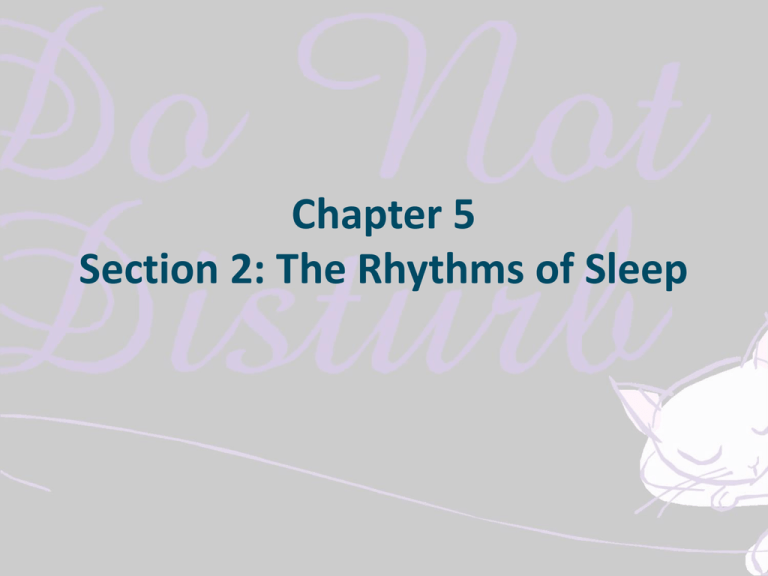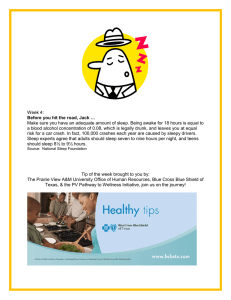Chapter 5 Section 2: The Rhythms of Sleep
advertisement

Chapter 5 Section 2: The Rhythms of Sleep Why Do We sleep? • The exact function is still uncertain. • Sleep appears to provide a time for rejuvenation and repairs. –Eliminate waste products from muscles, repair cells, strengthen the immune system, & recover abilities lost during the day • When we do not sleep, our bodies operate abnormally and we lose mental function • Sleep deprivation for 4 or more days becomes uncomfortable & soon unbearable –Can lead to infection & death • Necessary for normal mental functioning –In chronic sleep deprivation, high levels of cortisol may damage or impair the brain cells that are necessary for learning & memory –May even begin to have hallucinations & delusions Sleep Disorders • At least 40 million Americans suffer from chronic, long-term sleep disorders each year • These disorders interfere with work, driving, & social activities • Insomnia- difficulty falling or staying asleep –Resulting from worry & anxiety, hot flashes, arthritis • Sleep apnea- caused from blockage of air passages to failure of the brain to control respiration correctly –Can lead to high blood pressure & irregular heartbeat Sleep walking • Characterized by walking or some activity while sleeping • REM disorder • Difficult to wake during an episode • Can be caused by fatigue, stress, or anxiety • Narcolepsy- daytime attacks of sleepiness lasting 5 to 30 minutes • Causes of sleepiness –Staying up late & not allowing for enough sleep Nightmares • Stressful things that happen during the day can turn dreams into nightmares. • Nightmares may be a way to relieve the pressures of the day. How much sleep do I need? • Infants- 16 hours • Teenagers- 9 hours • Adults- 7-8 hours –Some can function on 5 others need 10 • When people are sleepy, traffic & work accidents are more likely • 2/3 of Americans get fewer than the recommended 8 hours –Lack of sleep has been linked to lower grades The Realms of Sleep • Until the early 1950s, little was known about the physiology of sleep. • Then a breakthrough occurred in the lab of physiologist Nathaniel Kleitman, who identified REM sleep. • The research led to our understanding of the stages of sleep. • Cycle that recurs every 90 minutes –REM average 20 minutes • Cycle –Alpha waves- regular, slow rhythm & a high amplitude, eventually slow down & you drift off Physiological/ Psychological Changes Awake, but Body is relaxed Sleep Stages Drowsy Stage 1 (5%) Stage 2 (44-55%) Heart rate slower, light sleep (1 & 2 last 30 min) Person may talk in their sleep Stages of Sleep Stage 1. Your brain waves become small and irregular, & you feel yourself drifting on the edge of consciousness, in a state of light sleep. If awakened, you may recall fantasies or a few visual images. Stage 2. Your brain emits occasional short bursts of rapid, high-peaking waves called sleep spindles. Minor noises probably won't disturb you. Stage 3 Deep sleep, somewhat difficult to awaken Stage 4 (1523%) REM (2025%) Considerable movement, most difficult to awaken 90 min. into sleep cycle, return to stage 1 & begin REM sleep; appear paralyzed, recall dreams when awakened Stage 3. In addition to the waves characteristic of Stage 2, your brain occasionally emits delta waves, very slow waves with very high peaks. Your breathing & pulse have slowed down, your muscles are relaxed, & you are hard to arouse. Stage 4. Delta waves have taken over, & you are in deep sleep. It will probably take vigorous shaking or a loud noise to awaken you. If you talk or walk in your sleep, this is when you are likely to do so. • Sequence takes about 30-45 minutes & then goes in reverse –About 70-90 minutes into sleep in stage 1, brain emits long bursts of rapid irregular waves, heart rate increases, blood pressure rises, & breathing becomes faster & irregular • Twitches may occur in your face & fingers, skeletal muscles go limp (REM) • Most likely to dream • REM & non-REM sleep continue to alternate throughout the night with stages 3 & 4 becoming shorter & tend to disappear –Varies from person to person




